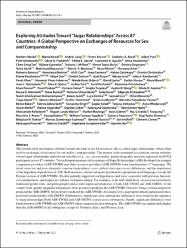Please use this identifier to cite or link to this item:
https://hdl.handle.net/20.500.11779/2158| Title: | Exploring Attitudes Toward "sugar Relationships" Across 87 Countries: a Global Perspective on Exchanges of Resources for Sex and Companionship |
| Authors: | Putz, Adam Kowal, Marta Bandi, Szabolcs A Kocsor, Ferenc Toplu-Demirtaş, Ezgi Láng, András Meskó, Norbert |
| Keywords: | Sugar relationships. Resources for sex Human mating Cross-cultural comparison |
| Publisher: | Springer |
| Source: | Mesko, N., Kowal, M., Lang, A., Kocsor, F., Bandi, S.A., Putz, A., Toplu-Demirtas, E., (Aralık, 2023). Exploring attitudes toward "sugar relationships" across 87 countries: a global perspective on exchanges of resources for sex and companionship. Archives of Sexual Behavior . pp.1-27. |
| Abstract: | The current study investigates attitudes toward one form of sex for resources: the so-called sugar relationships, which often involve exchanges of resources for sex and/or companionship. The present study examined associations among attitudes toward sugar relationships and relevant variables (e.g., sex, sociosexuality, gender inequality, parasitic exposure) in 69,924 participants across 87 countries. Two self-report measures of Acceptance of Sugar Relationships (ASR) developed for younger companion providers (ASR-YWMS) and older resource providers (ASR-OMWS) were translated into 37 languages. We tested cross-sex and cross-linguistic construct equivalence, cross-cultural invariance in sex differences, and the importance of the hypothetical predictors of ASR. Both measures showed adequate psychometric properties in all languages (except the Persian version of ASR-YWMS). Results partially supported our hypotheses and were consistent with previous theoretical considerations and empirical evidence on human mating. For example, at the individual level, sociosexual orientation, traditional gender roles, and pathogen prevalence were significant predictors of both ASR-YWMS and ASR-OMWS. At the country level, gender inequality and parasite stress positively predicted the ASR-YWMS. However, being a woman negatively predicted the ASR-OMWS, but positively predicted the ASR-YWMS. At country-level, ingroup favoritism and parasite stress positively predicted the ASR-OMWS. Furthermore, significant cross-subregional differences were found in the openness to sugar relationships (both ASR-YWMS and ASR-OMWS scores) across subregions. Finally, significant differences were found between ASR-YWMS and ASR-OMWS when compared in each subregion. The ASR-YWMS was significantly higher than the ASR-OMWS in all subregions, except for Northern Africa and Western Asia. |
| URI: | https://doi.org/10.1007/s10508-023-02724-1 https://hdl.handle.net/20.500.11779/2158 |
| Appears in Collections: | PubMed İndeksli Yayınlar Koleksiyonu / PubMed Indexed Publications Collection Rehberlik ve Psikolojik Danışmanlık Koleksiyonu Scopus İndeksli Yayınlar Koleksiyonu / Scopus Indexed Publications Collection WoS İndeksli Yayınlar Koleksiyonu / WoS Indexed Publications Collection |
Files in This Item:
| File | Description | Size | Format | |
|---|---|---|---|---|
| s10508-023-02724-1.pdf | Full Text- Article | 1.35 MB | Adobe PDF |  View/Open |
CORE Recommender
Sorry the service is unavailable at the moment. Please try again later.
Items in GCRIS Repository are protected by copyright, with all rights reserved, unless otherwise indicated.